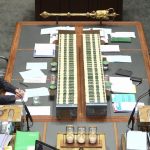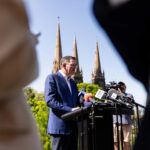Teaching is rocket science
The Federal Government supports a program called Teach for Australia that aims to fast-track graduates into teaching. Maurie Mulheron, the President of the NSW Teachers Federation, says outfits like these are a fundamental attack on teaching qualifications.
Many teachers throughout Australia have been deeply concerned at the support both major political parties have given to an outfit called Teach for Australia. It was modelled, none too subtly, on a US program called Teach for America. Following the Federal Budget, Education Minister Christopher Pyne announced an additional $22 million for the scheme on top of the previous $34 million the controversial program had already received.
Teach for Australia is based on the notion that graduates can be ‘fast-tracked’ into teaching having only received six weeks of training. NSW never embraced the model as it was quite rightly perceived as an affront to the profession and an attack on teacher qualifications.
Unfortunately, in Victoria, the land of devolution and deregulation, the University of Melbourne successfully tendered to run the program. However, criticisms of the program have perhaps now been validated. It comes at a time when Deakin University has been chosen to run the scheme rather than the University of Melbourne.
The Age (July 30) reveals that there is much more to the story. Recently, the Federal Government sought submissions regarding an inquiry into teacher education. The University of Melbourne’s submission to the inquiry was critical of the Teach for Australia program. One of the criticisms from the University’s submission said, “Programs like Teach for Australia — while five times more expensive than traditional programs — are increasing despite an absence of a reasonable evaluative basis to continue this support.” This submission by the University of Melbourne was published on the federal inquiry website and released to the media. The story was picked up by The Age. But then things get very interesting, and very troubling.
The Teach for Australia people were apparently furious and complained to the university. In a surprise move, the original University of Melbourne submission was withdrawn and then re-released. In the new version the paragraph that had offended Teach for Australia had been rewritten to read, “The rise of alternative programs in teacher education, such as Teach for Australia, should be welcomed, provided there is convincing evaluative evidence of their effectiveness and sustainability.”
Now this is an interesting take on ‘academic freedom’.
The Federal Government’s policy position on teacher education was made quite clear in the policy released just prior to the last election.
“The Coalition will work to explore more flexible pathways into teaching that are not bound by traditional training streams… However, current national accreditation standards… do not allow anyone without a discipline-specific qualification to enter a postgraduate teacher education course. The Coalition will…promote alternative career pathways into teaching…” (The Coalition’s Education Policy for Schools: Students First, August 2013)
So, the Federal Government believes that a ‘discipline-specific qualification’ is a barrier. I used to call mine a university degree. Little wonder that the Federal Government continues to fund and promote a six-week training course that even the university that ran it now criticises. Or should I say, used to criticise.
But the issue is this: these schemes are designed to lower standards and the status of the profession as they are a fundamental attack on teaching qualifications.
Of course, conservative politicians the world over are attacking teaching qualifications as a means of undermining the status of the profession. In the UK, the Cameron Government allows autonomous public schools to employ people with no formal teaching qualifications which brings them into line with private schools.
But teachers know that teaching is now more demanding and the work more complex than it has ever been. Perhaps Linda Darling-Hammond, Professor of Education at Stanford University, sums up the feelings of many of us, “Teaching is rocket science. It is really hard to teach all kids well given the range of the kind of intellectual demands, the kinds of diversity that we have, so teachers really need the kind of education that will allow them to be successful.” (Dan Rather Reports, episode 703)
Another notable professor of education, Lee Shulman, offers his thoughts: “After thirty years of [analysing teaching], I have concluded that classroom teaching is perhaps the most complex, most challenging and most demanding, subtle, nuanced, and frightening activity that our species has ever invented.” (The wisdom of practice: Essays on teaching, learning, and learning to teach)
I like the comment posted by a colleague on Facebook some time ago: “‘I wish a politician with no teaching experience would just come in and tell me how to teach’, said not one teacher.”
But my favourite reflection on the current state of teaching is this: Those who can, teach. Those who can’t, make laws about teaching.
Maurie Mulheron is the President of the NSW Teachers Federation. He has been a teacher in NSW public schools for over 30 years. For the ten years before to becoming President in 2012 he was a secondary school principal in the Wollongong area of NSW.














